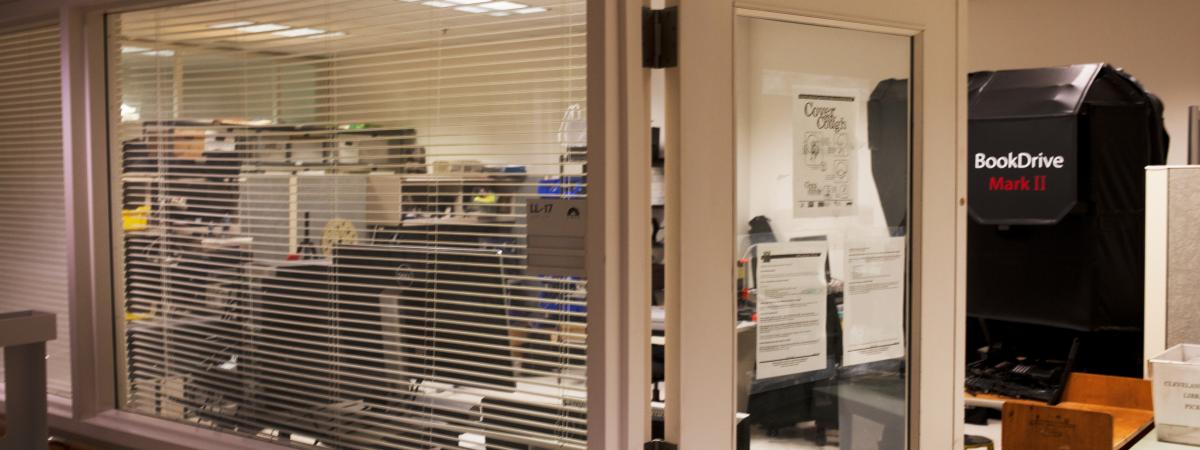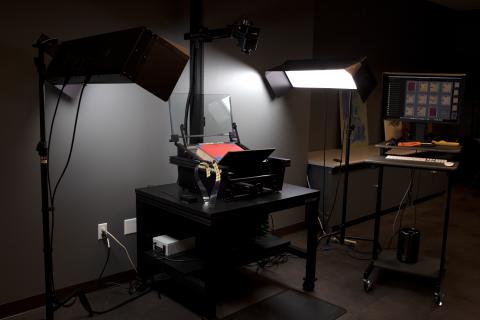Kelvin Smith Library is home to a series of laboratory workspaces dedicated to the long-term preservation and access of paper-based, audiovisual, and 3D collection objects. While each lab has its own physical space, staff expertise, and operating policies and procedures, staff often collaborate across labs in order to preserve, reformat, and provide access to the library’s holdings.
Digitization Lab
In the library's Digitization Lab, our highly skilled staff work to create digital reproductions of unique materials for preservation, scholarship, and other academic and general interest purposes. Using a PhaseOne Reprographic System, we can digitize a wide variety of media formats, including rare books, manuscripts, photographs, negatives, and more. Our main focus is to digitize the unique collections of Kelvin Smith Library, but we also partner with other campus libraries and various cultural heritage institutions on special projects. Our work can be viewed and downloaded from CWRU's Institutional Repository, Digital Case.
The Lab is currently digitizing the Cleveland Bystander and the Cleveland Town Topics, society magazines that ran from 1887-1934 and covered Cleveland art, politics, gossip, sports, theatre, music, business news, automobile news, and more. Other past projects include photographs from Cleveland Play House productions, viewable on Digital Case, and a collaboration with one of our Freedman Fellows to digitize ephemera from the Occupy Movement, viewable on the project’s Open Science Framework site.
In addition to our archival reproduction setup, the Digitization Lab has space and equipment for both traditional studio photography and advanced imaging techniques such as reflectance transformation imaging (RTI), photogrammetry, and multispectral imaging to support Digital Scholarship projects at CWRU. These techniques involve lighting and camera manipulation in order to reveal details of an object that cannot be seen by the human eye. We use these images to make digital models of artifacts that give researchers more information than can be obtained just from observations of the physical object.
Interested in learning more?
1. Take a look at our Digitization Vision Paper that outlines the creation, mission, and policies for our digitization program.
2. Follow us on Instagram @cwrudigilab for a closer look inside the lab.
3. Reach out with questions or inquires to collaborate with us at freedmancenter@case.edu.
Digitization Annex
A space for digitization research & development as it pertains to audio visual materials and 2D large format scanning, etc...
Project Highlights - (some examples of work that has been done in this space)
Featured Equipment - (some examples of equipment we have in that space)
Contact - freedmancenter@case.edu
Preservation Lab
The Preservation Lab is responsible for preserving the collections of the Kelvin Smith Library. This is achieved through preventive conservation such as environmental monitoring and disaster planning/response, physical stabilization/protection of Special Collections objects, and repair of Circulating library materials. The mission of the Preservation Lab is to keep library materials in all formats available for use for as long a time as possible and to explore new methodologies for investigating the materiality of our rare and unique collections.
The lab also serves as an instruction site to educate staff, faculty, and the community about Book History topics (bookbinding, papermaking, decorative techniques, etc.), the larger field of Conservation, and the importance of preserving our cultural heritage materials.
Some of our featured equipment includes: Board shears, paper guillotine, board bender, Kwik-print hot stamping machine, nipping/standing/lying/finishing presses, fume hood, specialty hand tools, aqueous/humidification treatment equipment, conservation-grade adhesives and supplies, trimming plow, and a foam core cutter.
Contact: kslspecialcollections@case.edu



